Ken Lizzi's Blog, page 11
November 23, 2023
A Dying Earth Feast
(With humblest apologies to Jack Vance.)
The Feast of Regrets ��� held annually, biannually, or at irregular intervals at Boumergarth, the four-towered castle of Ildefonse the Preceptor ��� was in full swing. The bloated red sun had limited its worrisome eructations to nothing more than a polite belch or two during the last month and Ildefonse���s guests appeared in a mood of pleasant high spirits rather than the perfervid gaiety that often accompanied festivities held during the sun���s more extravagant lurches toward oblivion.
Thirteen magician���s abiding in the Almery and Ascolais river valleys (or in the vicinity thereof) enjoyed Ildefonse���s hospitality. Among the notable guests were Mune the Mage, gruff and bulky Hurtiancz, the graceful youth (in appearance, at least) Byzant the Necrope, and the dapper Rhialto the Marvelous. The dining hall of Boumergarth scintillated. Smokeless flambeaux floated overhead emitting flames of emerald, carnelian, and brilliant azure. Tapestries of two aeon���s past, preserved in temporal stasis, adorned the walls, depicting fantastic and outr�� scenes of prior ages. Savory aromas suffused the feasting hall. The strength of the dining table���s legs was tested by the weight of viands, platters, decanters, and glasses burdening it in extravagant profusion.
Flush with wines and exotic liqueurs, the edges of appetite dulled with titbits and delicacies brought in from far reaches of the Dying Earth by Ildefonse���s indentured Sandestins, the magicians had reached a merry state, happily anticipating the main course: the roast Djinbird, famed for its vermillion plumage, rarity, uncertain provenance, and richness of flavor. At previous Feasts of Regret the very prospect of a succulent Djinbird had been enough to bring otherwise feuding members of the association of magicians, of which Ildefonse was Preceptor, to share the same table.
Rhialto, savoring a silver goblet of a yellow wine, abruptly tilted his head to one side, as if attuned to an auditory communique he alone could receive. He set down the goblet, rose, and sauntered to the head of the table to share a word with Ildefonse. Ildefonse nodded acquiescence and Rhialto left the dining table, returning some minutes later, followed by a pair of servitors bearing a domed platter beneath the weight of which they strained.
Rhialto retook his seat, tugging at his brocaded velvet doublet to ensure a becoming fit.
Hurtiancz launched into a relation of the safari he had undertaken aboard his whirlabout to secure the bird, an anecdote listened to with increasing impatience. After Byzant the Necrope���s�� eloquent clearing of the throat, Hurtiancz brought his narration to a close with ���and then once I had flushed the beast I dispatched it by invoking Benellis��� Leaden Spray.���
��Ildefonse now rose and addressed first Hurtiancz and then his guests.
���We are all edified by that succinct account. Ahem. Colleagues, esteemed practitioners of the esoteric arts,��� he began.
���The bird, Ildefonse,��� interrupted Mune the Mage. ���Get on to the Djinbird before the sun winks out at last.���
���Behold, the main course,��� Ildefonse summed up. ���Feast and abandon all regrets.���
One of the servitors raised the gleaming dome from the great salver, releasing a fulsome odor and revealing the moist, browned main course to a patter of jaded applause and one sotto voce ���About time.���
Platters clattered and goblets teetered, tottered, and toppled, deluging portions of the table. A figure appeared atop the table by the centerpiece, adjacent to the Djinbird, a figure that seemed to have stepped through a non-existent doorway. He presented a curious appearance, a man of angles, of long, lean limbs, a long nose, clad in scarlet hose and matching doublet trimmed with gold. He bowed, doffing a feathered cap to reveal jet black hair. A sword of extraordinary length jutted ceilingward as he bent. He straightened and as he did, was seen to pocket what appeared to be an oddly angled door handle.
���Pray forgive the unseemly intrusion,��� he said in a voice both droll and insinuating. ���And any inadvertent trodding upon the vittles. I beg your indulgence for the nonce, whilst I transact certain essential business. Then I shall depart, leaving you to mourn my absence.���
���You, sir,��� quoth Ildefonse, ���were not invited.���
���It is, I am afraid, often that way,��� replied the stranger. ���Life���s vicissitudes compel me more frequently than I could wish to avail myself of involuntarily generosity. Today serves as a prime example.��� He sighed a sigh of the unjustly beleaguered. ���Only last night I paid a social call upon the witch Fascolas. A call that, admittedly, she had neither requested nor expected. She discovered me admiring her collection of Whispering Opals. Now, perhaps you esteemed gentlemen are not familiar with the character, the err…voluptuous charms, and prurient nature of Fascolas.���
A shifting in seats and guttural throat clearings ensued, during which a statistically unlikely failure of eye contact ensued.
���Well,��� continued the stranger, ���Fascolas enjoined me to fetch the wishbone of a Djinbird on pain of compulsion to serve three years as her bath attendant.���
A horrified intake of breath followed this statement.
���Indeed. Your sympathies are appreciated. She loaned me this enchanted object that provided me ingress to this quaint abode,��� the stranger said, producing the door handle. He took a half step closer to the salver, nudging aside a silver gravy boat with the heel of one tall leather boot. He crouched, his length of limb and protruding knees putting one in mind of an immense crimson grasshopper.��
���This useful tool also functions as a means of egress. While I do wish I could remain and enjoy the repast with such witty, clever magicians as you, the truth is that there is none as clever as Cugel.���
���Quick,��� cried Mune the Mage, ���someone employ Mandelard���s Mesmeric Manacles!���
Alas, it was too late for any cantrip or spell. Cugel had a firm grip on one vast drumstick. He turned the door handle with his other hand. Then taking a crabbed, sideways step he, and the entire bird, vanished.
���What effrontery,��� harrumphed Hurtiancz.
���How could you have allowed this unseemly disruption, Ildefonse?��� charged Mune the Mage, as did several others with variations on the recrimination and certain choice selections of calumny.��
���I passed up bilbutter scones to save room for Djinbird,��� wailed Byzant the Necrope.
Through all the crosstalk and obloquy, Ildefonse merely smiled.
Rhialto stood up. ���Colleagues, please calm yourselves.���
���Whyever should we?��� whined Byzant the Necrope.
���I knew of Cugel���s impending arrival,��� Rhialto the Marvelous said, ���though not, of course, of its exact nature. I supplied the local Minuscules infesting the gardens of Boumergarth with four ounces of clover honey when I arrived today. In exchange they agreed to observe and report any strange activity. They noted this larcenous fellow skulking in the garden. One cannot always rely upon Minuscules, but this time they were true to the bargain and passed along the information.���
���Very interesting, I am sure,��� said Mune the Mage. ���Yet I hardly see how it renders the situation less appalling.���
���Patience, good Mune. Once I learned of the imminent arrival of a guest, I paid a visit to the kitchen. There I immobilized a Sandestin that owes me seven debentures and cast upon it the Spell of Impenetrable Seeming, imparting upon it the look, smell, and even tactile semblance of the Djinbird the cooks were even then extracting from the oven.���
Rhialto paused to chuckle at his own cleverness. ���Our friend Cugel ��� not to mention the witch Fascolas ��� will have quite a surprise when the spell terminates. Absent the Djinbird and its wishbone, I fear Cugel the Clever���s goose is cooked.���
A welcome fragrance preceded the arrival of the actual Djinbird, borne by a brace of servitors.
���Let us all give thanks,��� proclaimed Ildefonse. ���And, in the spirit of the Feast of Regrets, let us all spare a thought for the purloining gentleman of our recent acquaintance. Despite his distinct lack of plumage, I suspect friend Cugel is well and truly plucked.���
If you enjoyed that bit of nonsense, more of my scribblings are available here. Or (some of them at least) wherever you buy books online.
November 19, 2023
Golden Blood. A Jack Williamson Adventure Textbook
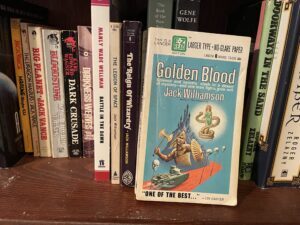
Was the 1930s the last great period of adventure fiction in the modern era? There’s Indiana Jones, Tales of the Golden Monkey, Robert E. Howard’s oriental and boxing tales, to mention a few examples. And then there is Jack Williamson’s Golden Blood.
What captured my attention was the tank on the cover. And then the first couple of chapters sold me completely. The concept of a (then) modern military assault on a mysterious, perhaps magical stronghold of a lost civilization couldn’t have been better designed to appeal to me. I was all ready for something reminiscent of Brian Daley’s Doomfarers of Coramonde. That anticipation, I think, is the genesis of the very minor disenchantment I experienced during my reading of Golden Blood, and that is entirely my fault. Williamson was telling a different story, not catering to a future generation.
And that story was vintage 1930s, with a dash of lost world, a shot of reincarnation, and tip of the hat to H. Rider Haggard’s She. The protagonist is out of central casting, a rich, world weary veteran of the great war. He is recruited to mount a military campaign to retrieve an unimaginable treasure from a legendary lost city in the heart of the Arabian desert. As you might expect, that lost city isn’t so legendary after all. A beautiful woman arrives at the camp at one point and utterly upends our hero’s goals. We get a glimpse of the modern versus magical/psuedo-scientific warfare that I had hoped for, but much of it occurs outside the protagonist’s POV. Meanwhile the story begins to follow the more traditional tropes of the period adventure tale. Our hero get repeatedly knocked out, imprisoned or left for dead, is rescued or finds a way to extricate himself. Meanwhile the villain gloats, provides background history, explains some of the gobbledygook pseudo-science behind the miracles and his apparent immortality, and fails to kill the hero multiple times when he is at the villain’s mercy. As expected. Also, as expected, is the villainess’ reaction to seeing the hero, and this ties into the reincarnation angle. The hero perseveres, doggedly pursuing his goal of rescuing the girl through seemingly unsurmountable obstacles. Along the way, we get lots of hand to hand mortal combat, gigantic beasts, lost tombs, golden palaces, caverns deep in the heart of an ancient volcano, freeze rays, camel cavalry charges, tanks, machine guns, cinematic mirage projections, seductions.
A lot of good stuff. And yet, while I do recommend it, it left me unmoved. If I were to re-read some Williamson it would probably be the stirring re-imagining of the Theseus myth The Reign of Wizardry, or the utterly bonkers The Legion of Space. Golden Blood is a fine exemplar of 1930s fantastic adventure. But it feels by the numbers, as if the components had been purchased off the shelf then assembled with competence but without any real passion or genius. Still, it is probably worth your time. I am glad I read it. I’m on record as a Jack Williamson fan and I haven’t changed my mind.
The 2020s perhaps cannot compete with the 1930s for romance and adventure, but I have given it a shot. Check out the Semi-Autos and Sorcery series for some contemporary fantasy adventure.
November 12, 2023
The Borgia Blade. All Killer, No Filler.

Gardner F. Fox‘s The Borgia Blade is a��distillate of Rafael Sabatini, served with a squeeze of romance novel in a man-sized pewter tankard. Fox streamlines the historical adventure novel, keeping only the good stuff. And yet at the same time one gets the impression that he���s putting all his research on the page. That is usually a criticism, suggesting an overstuffed narrative filled with extraneous minutiae. But not in this case. Borgia Blade is replete with period detail of the sort that delights the student of medieval and renaissance military history yet simultaneously serves the purpose of establishing time and place. Along with the careful depiction of attire, buildings, and furnishings, the verisimilitude Fox creates elevates Blade above a cliche-ridden. swashbuckling bodice-ripper (which in many glorious ways it is.)
Fox moves the plot along crisply, pulling off the seemingly contradictory feat of writing with both economy and verve. A rather standard issue protagonist, physically gifted yet hopelessly naive and easy prey to the simplest of traps and stratagems, Ilarion the stable boy and master swordsman becomes a pampered pet of a Machiavellian Cesare Borgia who hopes to use him as a pawn in a scheme that is revealed near the end of the novel. Most of the hints are there and it wouldn’t require Hercule Poirot to piece it all together. But that isn’t the point. Blade is not a mystery. It is a page-turning action tale, of the sort one might expect to have seen on the big screen in the heyday of Errol Flynn. The cover tells you all you need to know, though of course it is woefully inaccurate, depicting costuming from the late eighteenth century and a hero wielding a dress smallsword, rather than the late fifteenth, early sixteenth century Roman attire and rapier that the book describes. But my quibbling does not diminish the fun and bravura of The Borgia Blade.��
If after reading it you find yourself still in the mood for action and adventure, you’ve come to the right shop. Most of what I’ve written would meet your requirement. But how about some Sword-and-Planet science fiction? Under Strange Suns will satisfy. Or if you’re looking for something in the fantasy, Sword-and-Sorcery department, why not try the Falchion’s Company series. (Ask me about codes for free audio books.)
November 5, 2023
Tsalmoth. Vlad Taltos Bears Up Under Adversity.
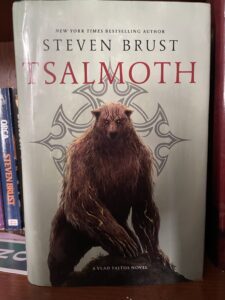

That saga of Vlad Taltos continues with Tsalmoth, the sixteenth book in the series. Tsalmoth is a��tale set in Vlad���s early days. He���s still a minor boss and occasional assassin. There���s a touch of the original ���cool��� factor and at the same time, Brust is layering in universe-building information which may, or may not, become important as we near what should be the culmination of the series. There are what, two left? Chreotha and Lyorn? It is good to be back in Vlad���s office with his henchmen, worried about collecting a debt and feuding with other underbosses. The snappy, sarcastic banter is as fun as it has always been. It may lack a certain depth of detail, as if Brust figures that if you���re reading this one he doesn���t need to provide more than surface level verisimilitude; that if you are fool enough to dive in at book sixteen any confusion is your own fault.
The book is weakened somewhat from an undercutting of Vlad as a competent hero. Perhaps it is to be excused by the narrative theme of Vlad���s infatuation; by his concern with his impending nuptials and his obsession with Cawti, his betrothed. Remember this is a flashback story. But I can���t help but feel that Vlad is undermined as a protagonist, continually outclassed by the superior skills of Cawti. He seems to be in much the same position as the stereotypical male portrayed in television commercials: befuddled, inept, and surpassed in all things by his better half. Brust has always been burdened with his…unfortunate political inclinations. I wonder if this book represents his attempt to fall into lockstep with the current crop of comrades, who are more concerned with the interpersonal than the Internationale. If so, Vlad suffers for it, losing a degree of that edge, that coolness that he exuded in the first few books. I don���t know. Maybe Brust isn���t surrendering a portion of testicular fortitude in an effort at appeasement. Perhaps I���m merely getting old. It isn���t the mid to late eighties anymore. I���m not in highschool. The truth could be that I���m just no longer so easily impressionable, that I expect too much.
But the immediately preceding paragraph is largely quibbling. The essential determinant of a book’s value is whether or not I enjoyed it. And, happily, I did. Once again Brust’s smart ass first person narration entertains, carrying the reader past slow points and masking the general triviality and lightweight nature of the plot. Tsalmoth may be a place holder, a book written because the Tsalmoth is one of the creatures in the Dragaeran cycle and so there must be a book with that title to complete the series. Appropriately circular reasoning. If you are a fan of the series you will want this one. It may be lesser Vlad Taltos, but it is still Vlad Taltos.
If, after reading Tslamoth you’ve had your fill of Vlad Taltos for a while, why not switch over to some Karl Thorson? The Semi-autos and Sorcery novels are here to cater to all our fantasy action/adventure needs.
October 29, 2023
Liavek. Not Coming Up Sevens.
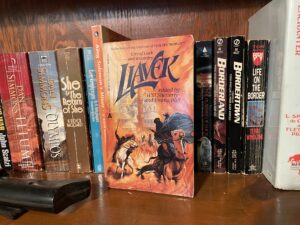
The Thieves World series made a splash in the eighties with its stories of anti-heroes, burglars, wizards, crime lords, warriors, bards, various underworld denizens, and the occasional common, law abiding (more or less) citizen of Sanctuary. Will Shetterly and Emma Bull, et al, decided to see if they could recreate that Thieves World magic with Liavek, a mercantile port city with a hyper detailed history, culture, and — most notably — a magic system. I read the first couple collections when they first came out. How does volume one hold up on a re-read? Let’s find out.
Badu’s Luck. Emma Bull. Women eating, drinking, talking, and shopping. I’m sure there is an audience for tis type of fantasy — and Bull is a competent writer — but I had trouble staying awake until the plot finally kicked in. Knowing that Gene Wolfe was on deck and would reward my patience, I pushed through. Once it finally got going the story was engaging enough, providing the reader a solid grasp on the essentials of the shared world in which the rest of the stories would take place. If not my cup of tea, Badu’s Luck at least wasn’t overly objectionable.
The Green Rabbit from S’Rian. Gene Wolfe. A taut adventure, featuring a sea battle and a twist or two, as well as a vivid portrait of imaginative magic. Gene Wolfe shows himself at the top of his game even in short fiction.
Ancient Curses. Patricia C. Wrede. Irascible magical grannies can often be sufficiently entertaining to mask a story’s shortcomings. This granny comes close. A story that depends upon magic needs to spell out the rules clearly, otherwise the conclusion can smack of deus ex machina cheating. This one? Borderline.
Birth Luck. Nancy Kress. A domestic drama, the plot of which is entirely premised on the inner workings of magic. I tried to like it, but could invest nothing in the characters or their fates. This story represents the obverse to the coin of the rule that magic in a story requires rules. This one is only about the rules and is thus, frankly, boring. Wile a reader should know the rules, the rules are not inherently that interesting. Train tracks are important, not interesting. The train is interesting. I think this story highlights one of the problems with Liavek: the creators were so enamored with their unique magical rule system that they assumed everyone else would be as well, that the explication of its features and nuances would in and of themselves entice readers.
An Act of Contrition. Steven Brust. Trust indulges his Alexander Dumas obsession. And I, for one, couldn’t be happier. The dastardly doings of his ersatz Count Rouchefort provide a needed nostrum to counteract the tedium of the previous tale. People actually do things. Action occurs. Duplicity, bloodshed, skullduggery. Good, diabolical fun.
The Inn of the Demon Camel. Jane Yolen. Moderately amusing, a comic story related by an unnamed storyteller. I almost smiled twice.
The Hands of the Artist. Kara Dalkey. This one was okay.
The Green Cat. Pamela Dean. Unpleasant and frequently tedious.
A Coincidence of��Birth.��Megan Lindholm. Liavek expands upon Thieves’ World‘s occasional use of slice-of-life, quotidian characters as protagonists, rather than the thieves, soldiers, and bravos featuring in others. The problem is — same as it is with Thieves’ World — that the characters we remember, those we care about, are the thieves, dangerous wizards, demi-gods, and bad-asses. Not the artists, tavern wenches, stone masons, and green grocers. The point being, Coincidence is a decent story and does its job of creating verisimilitude and filling its pages with world building, but…it was kind of boring.
Bound Things. Will Shetterly. Despite the magical-procedural nature of the story there is a nice confidence game/scheme unveiling aspect in the tradition of Mission Impossible or The Sting. The characterization is fun. It is possible to play with magic system rules and still tell an entertaining story.
The Fortune Maker. Barry B. Longyear. Another example of the importance of character selection. The troll-haunted, simply, bond servant trash picker failed to resonate strongly with me. Maybe it worked better for others. It was…nice. Though very long. Too long.
I am afraid I am unlikely to jump right into reading volume two. I really only enjoyed three of the stories. Reading the others felt more like a chore than a pleasure. Yes, the authors did a good job of collaborating in the creation of a detailed world that feels lived in and vibrant. But if it fails to entertain it fails in its ultimate purpose. And I feel that the creators lost sight of that purpose, being too engrossed in the world building aspect.
What do you think? Did Liavek work for you?
You know what might work for you? Under Strange Suns. People seem to like that one. It even won a silver medal. (Though I never actually received any hardware. Hmph.) Give it a read, let me know if I managed to entertain.
October 22, 2023
The Tritonian Ring: Barbecue in L. Sprague de Camp’s Backyard.
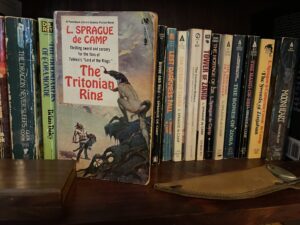
L. Sprague de Camp’s The Tritonian Ring is bronze-age sword-and-sorcery. In its pages he fits in lost continents, suggests origins for certain myths: medusa, gorgons, Amazons, etc., and provides a whirlwind tour of his pre-historic world of anxious, fallible gods, overly arrogant wizards, and bizarre societal habits. The driver of the narrative is the quest of prince Vakar to find the thing the gods fear the most in order to thwart an invasion of his kingdom instigated by the gods. The result is an episodic adventure full of journeys, heists, captures, escapes, duels, and full scale battles, all interspersed with idle dalliances.
It is all good fun. In fact, if one were to have a complaint it might be that that is all it is: good fun. de Camp is having a good time and he wants us to enjoy it too. Despite all the danger to life and limb, the last minute reprieves, the hairsbreadth escapes, there is never any real concern for Vakar’s well being. He is merely the vehicle ferrying the reader through de Camp’s safari of amusing exotics. The tongue seldom leaves the cheek.
And that’s perfectly fine with me. Not every meal needs to be a dinner party during which the world’s ills are evaluated and remedies proposed. Sometimes you just want to go to a backyard barbecue, crack a beer, and eat a burger straight from the grill while trading jokes with your neighbors. That’s what you get with The Tritonian Ring, uncomplicated, yet still thoroughly enjoyable fare.
If you’re still hungry after that, why not dig into my Semi-Autos and Sorcery series? The prices are right, the books are fun, and hey, I’ve got to keep the lights on in this joint. You can pick up the first book here.
October 15, 2023
Castaways In Time. A Mood Piece.
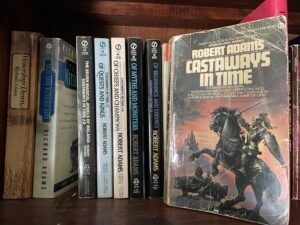
Robert Adams’ Castaways in Time served a load bearing function in my youth. I must have been twelve or thirteen the first time I read it. Along with The Lord of the Rings, it was a book I went back to again and again. LOTR I continue to return to. Castaways, however, has remained untouched since the late eighties. I have been reluctant to revisit it, afraid it would not hold up to my memories. But now I find myself nabbing books almost at random from my shelf. Caution be damned.
So, did it hold up?
Let me defer that answer and provide some context. Castaways is a science fiction novel, in that the time travel occurs by sci-fi gobbledygook rather than magical folderol. In point of fact, the travel isn’t precisely back in time from our Earth, since the characters end up in a parallel world, in circa 1600. The protagonist, Bass Foster, along with his house and several uninvited guests find themselves in an England currently at war, being invaded by Crusaders. I won’t get into the politics behind it: Adams will. In exhausting detail. Bass and company become embroiled in the events and the narrative follows some of the occurrences over the next few years up until the point Bass’ house returns to our present (absent human presence due to a last minute escape.) The end.
So, did it hold up?
The thing you need to understand is that Castaways is not a novel in the conventional sense. Adams provides a setup and a framework upon which he could have hung a traditional narrative. But that isn’t what Adams is interested in doing, as you are probably aware if you’ve encountered his stuff before, e.g. The Horseclans novels. He is only mildly interested in characters, working mostly in broad caricature, jumping through the story episodically so that the characters lack any through-line of development. Heal turns come without much in the way of foreshadowing. He is interested in physical details, primarily concerning weapons, armor, tactics, period technology, attire, etc. He is interested in dialog as a platform to play with recreating dialect and accents in print. (He is not, however, interested in dialog to recreate the way people actually construct sentences and communicate. Quite often his characters communicate in the sort of speeches Herodotus put in the mouths of historical figures.) He is interested in the detailed historical backstory of his world, like the fifty-page timeline of a home-brew game world created by an obsessive-compulsive roleplaying game enthusiast. He is interested in battles, his strong suit. He carries the reader through, providing big picture details when necessary, plunging into the chaos endured by the protagonist at other times, and larding it all with the stink, blood, mud, fear, and exhaustion that sells the reality of it.
And there is the crux. Does it hold up? (Answer the damned question, Ken.) Yes, because it isn’t a novel. It is a sensory download, a grain within an oyster about which is spun a pearl of imagination. It had been decades since I’ve read this book, but it has provided decades of fodder for daydreams. What if my house ended up somewhere else? How well stocked am I? What would I carry with me to step outside and begin exploring? These are the sort of idle speculations that have recurred over the years because of this book.
Now, will I read the sequels, the other five books in the series? I don’t know. Probably not. I recall the second one being pretty good, but that the rest suffer from a bad case of diminishing returns. Also, to the best of my recollection, the series has no end. There is no wrap-up, denouement, or conclusion. Another Adams trait, it seems. But I don’t care: Despite my quibbles, I cannot deny that the essence of Castaways remains vibrant.
A bit of housekeeping: If you are on BookBub, please look me up and follow. MBW, also known as my marketing manager, would be pleased. And speaking of marketing, let me spin the wheel of promotion…Please pick up a copy of Reunion. I think those of you who enjoy a good action/adventure story will appreciate it.
October 8, 2023
The Harp and The Blade. John Myers Myers Sparkling Heroic Historical Fiction.

I keep going back every decade or so to John Myers Myers. Usually it is to immerse myself fully in his magnum opus, Silverlock. But this most recent re-read was The Harp and The Blade. The cover art in my edition is nice, though the cover description is utterly misleading: “A fantasy of Druidic England.” Wrong on all points. It is quite a feat to be so entirely mistaken. Imprimus, it is not a fantasy, but rather a work of historical fiction. Secundus, it is set circa 950 AD. Hardly the druidic era. Tertius, the story takes place entirely in France. Not a second of action occurs in England.
But don’t let boneheaded marketing fool you. This book is terrific. (Digression: It is third historical novel marketed as fantasy that I’ve read recently. They have all been good. I don’t know what to make of that.) It tells the story of an Irish bard, Finnian, trying to make his way across France. By deliberate inaction he allows a man to die. The only fantastic element occurs shortly thereafter: he is cursed (or believes he is cursed) to help those in need. In the tumultuous power vacuum post-Charlemagne, with viking raids, and North African corsair raids, and local petty princes fighting for territory, Finnian finds more than one person in need of help. Most notably he helps a local minor noble, commencing a friendship. Battles, captures, escapes, romance, and feasting all follow, written about in warm, glowing, accessible prose.
John Myers Myers was a singular talent. His writing is suffused with joie de vivre. He peppers his stories with poetry. Poetry you read rather than skip, as it tends to be delightful, witty doggerel. The entire gamut of the human experience is presented, he doesn’t shy away from the dark aspects. Yet what rises to the top is joy. The interludes of drinking, companionship, and banter absolutely sparkle. Reading John Myers Myers tends to exercise the smile muscles. But of course, as Myers Myers did seem to have a sober grasp on humanity, the end of The Harp and the Blade is…well, I won’t spoil it for those of you lucky enough to read it for the first time.
Even after my third or fourth time through, the novel still delivered. I’d like to think my Semi-Autos and Sorcery series delivers. Why not give Blood and Jade a read?
October 1, 2023
Beowulf: Part of a Healthy Root System.
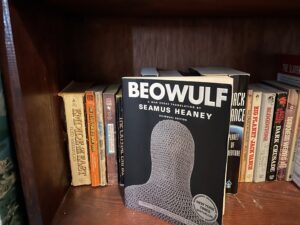
I have read Beowulf a couple of times, but it has been some years since my last visit to Heorot. I picked up a copy of Seamus Heaney’s translation a week or so ago and plunged right back into the feasting and carnage and recounting of raids, counter raids, and giving of gifts. It remains glorious.
Beowulf belongs to that tradition of supermen, strong beyond mortal capacity, capable of incredible feats of endurance. I mean, the man can hold his breath for most of a day and swim for a week. He is in good company, joining the ranks of Gilgamesh, Samson, Hercules, and Cu Cuhlainn, to name just a few. Later entries include Paul Bunyan and Pecos Bill. From that American branch derive such offshoots as Popeye and, yes, Superman. Also, happily, genre variations like Breckenridge Elkins. And Conan, the great grand daddy of sword-and-sorcery strongmen, whose progeny are still flourishing today.
People have always craved tales of extraordinary men, superlative heroes. Demigods who retain our mortal proclivities and weaknesses, who might still succumb to the dragon’s fire, fighting one last time at an advanced age.
Raise your mead horn to Beowulf.
And why not raise a beer mug to Brick, the strongman protagonist of Thick As Thieves. What, you haven’t read that one? That can easily be remedied.
September 24, 2023
Leigh Brackett’s The Coming of the Terrans. Mars as God and ERB Intended.
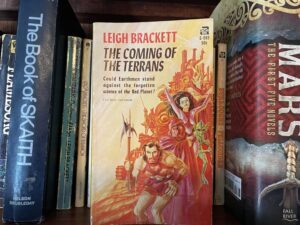
Leight Brackett’s The Coming of the Terrans is a slim volume, packaging five thematically related stories. Slim, yes, but not light weight. Brackett takes what could be a frothy, fun topic of men on ancient, dusty Mars and instead gives us insightful tales in her own unique Martian setting: a grim intersection of Edgar Rice Burroughs’ Barsoom and Ray Bradbury’s Martian Chronicles.
This insight shouldn’t come as a surprise. Brackett has long demonstrated that she understands the inner workings of men. In Terrans, Brackett turns her attention to the tragic, yet inevitable results of the clash of civilizations; of the meeting of divergent levels of technological development; of the conflict of incompatible cultures; new ideas running into ancient wisdom. Colonization, assimilation, resistance, and subversion. She could have gone the easy way and written allegorically. She eschewed simple analogs of desert tribesmen versus British imperialists, or the US Cavalry patrolling the perimeter of an Indian reservation. Brackett was too wise for such a simplistic take and the choosing of sides. Instead she wrote these complex, nuanced stories that generally lack white hats and black hats. And all set in an internally consistent world, a dying planet that is home to multiple Martian races and the graveyard of many others; of weathered, incredibly ancient cities in the dusty basins of long vanished seas; of savage raiders, cosmopolitan traders, idealistic scientists, and unscrupulous adventurers.
I found Terrans worth my time. It might be worth yours.
Something else that might be worth your time, speaking in a roundabout fashion of Mars, is Under Strange Suns, my homage to ERB’s Barsoom.



